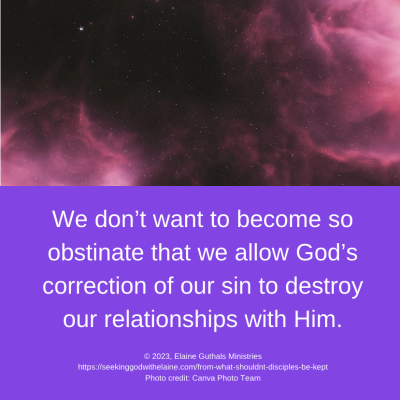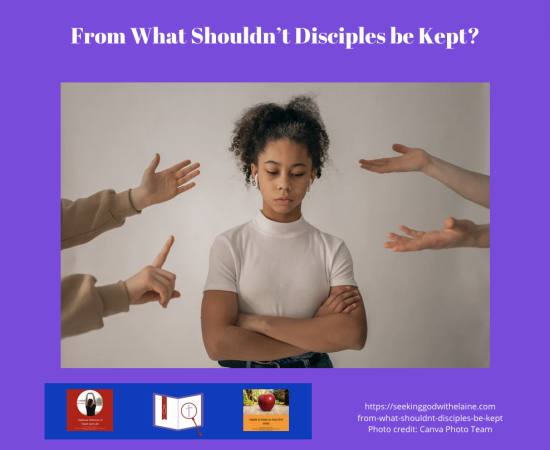Isn’t it assuring that disciples should be kept from evil? But what does that mean? This devotional reading begins looking at things from which we should not be kept.
Nuggets
- Disciples shouldn’t be kept from God’s love.
- Disciples shouldn’t be kept from discipline.
- Disciples shouldn’t be kept from being judged.

This devotion is going to start a new series in a new study. The study is going to be Habits to Keep Us from Evil.
Before we can figure out what habits we need, we have to identify the evil from which we should be kept.
We are using Wilcox’s sermon to delve into this. He started with a list of things from which believers shouldn’t be kept. He wrote it is not “An absolute freedom from all afflictions, which are either the consequences of sin or corrections of God.”
Resource
What do we as disciples need from God and shouldn’t be kept from?
Let's Put It into Context
To read devotions in the Habitual Holiness of Heart and Life theme, click the button below.
Here is a running list of nuggets for the theme.
Devotions in the Habits to Keep Us from Evil study
Here is a running list of nuggets for the study.
We are using Wilcox’s sermon as the foundation for this series.
Resource
God’s Steadfast Love
“My steadfast love I will keep for him forever, and my covenant will stand firm for him” (Ps. 89: 29 ESV)
Disciples shouldn’t be kept from God’s love.
We know that God loves believers and non-believers. “For God so loved the world, that he gave his only Son, that whoever believes in him should not perish but have eternal life” (Jn. 3: 16 ESV).
God loves all the world. His salvation is available to all. Each of us has to make a conscious decision whether or not to follow Him.
Does it surprise you that God loves non-believers? It shouldn’t. His character is love.
But don’t delude yourself into thinking God will be lenient toward non-believers. They will eventually get their Judgment Day.
We will be corrected just as Israel was corrected.
“But if you turn aside and forsake my statutes and my commandments that I have set before you, and go and serve other gods and worship them, then I will pluck you up from my land that I have given you, and this house that I have consecrated for my name, I will cast out of my sight, and I will make it a proverb and a byword among all peoples. And at this house, which was exalted, everyone passing by will be astonished and say, ‘Why has the Lord done thus to this land and to this house?’ Then they will say, ‘Because they abandoned the Lord, the God of their fathers who brought them out of the land of Egypt, and laid hold on other gods and worshiped them and served them. Therefore he has brought all this disaster on them’” (II Chron. 7: 19-22 ESV).
Isn’t that what books of the Old Testament are about? Israel turned away from God and Abraham’s covenant. God sent them into exile; sent earthquakes and famines to correct them; listened to their repentance and forgave them; and brought them back to freedom.
God could have withdrawn His love from us after the original sin – or at any point thereafter. He didn’t.
God chose to fulfill His covenant with Abraham – and now His covenant with Jesus.
But that doesn’t mean God won’t correct us when we sin. He has a variety of ways in which He does that. He can switch up the mean, measure, and duration in which He does that.
Regardless of how He chooses to correct us, God will never withdraw His love from us.
Two Dangers of Correction
“‘For the Lord disciplines the one he loves, and chastises every son whom he receives.’ It is for discipline that you have to endure. God is treating you as sons. For what son is there whom his father does not discipline?” (Heb. 12: 6-7 ESV)
Disciples shouldn’t be kept from discipline.
Ooo, baby. We know we’ve done wrong, but we so hate to be disciplined.
No, we aren’t sent to the principal’s office to get our bottoms spanked. As we just discussed, God uses a variety of corrections to get the job done.
Despising Corrections
We shouldn’t kick and scream when God corrects us. Bates said that disciples should “… preserve themselves from the vicious extremes of despising the [chastenings] of the Lord, or fainting under them.”
Resource
That is logical. That fits in with being sober. Being sober is a character trait distinguished by self-control, genuineness, and sound moral judgment. It is a calm and temperate disposition.
Being even keeled when we are sober means we don’t experience the extremes when we are corrected. We are content with whatever comes our way.
Instead, we should make sure we know exactly why God is correcting us. We need to evaluate ourselves to determine the status of our relationship with Him.
I know. Self-evaluation can be painful, too. It can seem unending.
God wants us to partner with Him in transforming us to who He wants us to be.
Fainting
We tend to think we become unworthy when we sin. We have to realize that God still counts us worthy enough to warrant correction.
Whenever we are corrected, it is for God’s glory. The goal is to redirect our paths to follow Him more closely.
Think about it. It really dishonors God when we kick back at Him trying to improve us.
But yet we do because the correction usually hurts. And face it, we are usually allergic to pain.
We don’t want to become so obstinate that we allow God’s correction of our sin to destroy our relationships with Him.

What happens when we don’t endure the correction? “Consider him who endured from sinners such hostility against himself, so that you may not grow weary or fainthearted” (Heb. 12: 3 ESV).
We get tired and faint. But to me this is more than lose consciousness for a short amount of time.
To me, this will turn us into a Matthew 7: 21 person — who is really a goat.
To read a related devotion, click the button below.
Fainting here isn’t exactly as we think it is. This isn’t weak and dizzy until we lose consciousness.
This is choosing to give up on God. Whether we are angry at God of what we consider punishment or whether we give up thinking this is all there is because it will never end, the choice is made to turn away from God.
When we kick at God’s correction, we set ourselves up for further temptations by Satan. Those sins are going to be worse than the ones we’ve already committed.
That makes God withdraw His judgments from us. Trust me, we don’t want God withdrawing from us in any way, shape, or form. We may think we are better off because the pain of the correction isn’t happening.
We aren’t.
What we must never lose sight of is that God sends the corrections as our Father. True, it has an element of judgment, but the intent is to transform us into His pure children.
The corrections we get here on earth are nothing compared to the judgment we will receive on Judgment Day. This isn’t punishment.
This is love. God loves us enough to want to transform us to be more like Him.
God loves us enough to do the hard things to cut sin out of us.
Judged, not Condemned
“But when we are judged by the Lord, we are disciplined so that we may not be condemned along with the world” (I Cor. 11: 32 ESV)
Disciples shouldn’t be kept from being judged.
I know. The world doesn’t think it is condemned.
It is.
“Whoever believes in him is not condemned, but whoever does not believe is condemned already, because he has not believed in the name of the only Son of God” (Jn. 3: 18 ESV).
The world was condemned as soon as Adam and Eve bit. They just don’t want to accept that.
But then, the world doesn’t think that God should be the one to judge it, either. Some things God says is a sin isn’t in their book. Plus, that is when they stress free will.
Why are there degrees in judgment? Vaughan addressed that. He wrote,
“And I cannot read in this record the ‘thus far and no farther.’ I catch here the faint echo of the thought that God our Father has us all in His school, and is carrying on our education for a life beyond death by a direct providential dealing with us in the way of mental and bodily chastisement. ‘For this cause’ — because of such and such a sin, with which the man would not deal for himself — ‘many are weak,’ etc.”
Resource
- God doesn’t box Himself into a corner regarding how far He will go to correct us. His goal is to get the job done, not sugarcoat it for our sakes.
- God is correcting every one of His children. We don’t get a pass.
- Some correction may be physical. Some may be mental. God has a variety of methods at His disposal.
- Regardless of the variety of methods and durations, the root cause for the correction is the same in all cases — sin.
How can this correction give us hope? How can it not?!?!
God is correcting us in anticipation of perfecting us.
Don’t get me wrong. God isn’t up in Heaven, rubbing His hands together in anticipation of inflicting pain on us.
If He could find another way to reach the goal of correcting us, God would. But He can’t.
Now, we may try to get out of our part in correcting us. That doesn’t mean the correction is avoided. God will do it all Himself if need be.
Nor can we do all the correcting ourselves— even if we include suffering. God is the only One Who can transform us.
The way to look at judgment and correction is that it isn’t us against God. We are on the same team — God’s team.
But hold on a second. We have to put this verse in context.
Paul is talking about the Lord’s Supper in this passage. His point is that we need to evaluate ourselves before we observe the ordinance.
God is chastising His children for not worshiping Him correctly. His correction is always about our spiritual condition, not just our actions.

Making the Connections #1
Smeaton gave us a great reminder. He wrote, “It is taken for granted that the seed of Messiah shall go astray; but their sins, it is added, do not break the covenant, which stands fast for evermore; for it was not made with us, but with the Son for us.”
Resource
Disciples have gained salvation, but we have not yet been perfected. We are still going to sin.
What Smeaton said – the seed of the Messiah will continue to sin – agreed with what John wrote. “If we say we have no sin, we deceive ourselves, and the truth is not in us” (I Jn. 1: 8 ESV).
God does not withdraw His love when disciples continue to sin no more than He withdraws it when we don’t ABCD.
Why? God’s love is based on Him and Who He is rather than what we do nor do not do.
Making the Connections #2
It all boils down to how we react to this correction. I love how Fuller told us to respond. He wrote, “Let us, then, [endeavor] to amend, when God layeth His least judgment upon us. Let us humble ourselves under His hand when He layeth but His ‘little finger’ upon us; for light punishments, neglected, will draw heavier upon us.”
Resource
- We respond in repentance.
- We respond with humility.
- We respond immediately.
We shouldn’t ignore God’s correction.
How Do We Apply This?
- Expect God to correct us when we sin.
- Remain even keeled when corrections come.
- Realize God considers us worthy enough to be corrected.
- Be excited about following God’s laws and commandments.
- Humbly submit to and depend on God in everything.
- Don’t faint or turn away from God.
- Don’t talk back when corrections come.
- Use the corrections to fuel repentance.
Resource
Father God. We want to be transformed by You. We know that will mean enduring discipline and judgment. We are ready for that. May we never be separated from Your love. Amen.
What do you think?
Leave me a comment below (about this or anything else) or head over to my Facebook group for some interactive discussion.
If you don’t understand something and would like further clarification, please contact me.
If you have not signed up for the email providing the link to the devotions and the newsletter, do so below.
If God has used this devotion to speak with you, consider sharing it on social media.